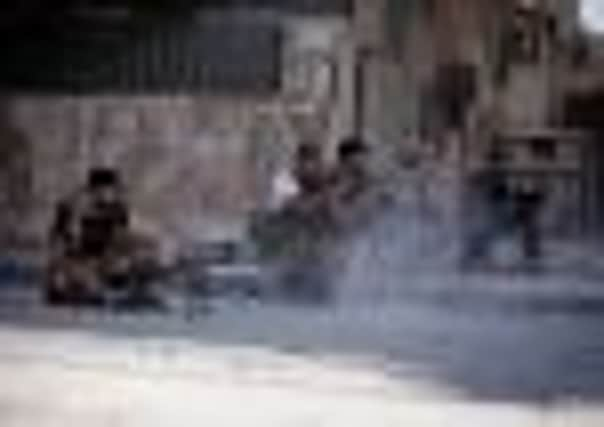UN says foreign fighters are ‘radicalising’ rebels in Syria


The investigative panel appointed by the UN’s Human Rights Council said yesterday that outside “terrorists” have joined the country’s civil war, with some of these forces joining armed anti-government groups while others are operating on their own.
“Such elements tend to push anti-government fighters towards more radical positions,” said the head of the panel, Brazilian diplomat, Professor Paulo Sergio Pinheiro. He referred to the foreigners as “terrorists”, though the word did not appear in the written report.
Advertisement
Hide AdAdvertisement
Hide AdThe panel accused government forces and pro-regime militia of war crimes and crimes against humanity including murder, summary executions, torture, arbitrary arrests, sexual violence and abuse of children. It accused anti-government armed groups of murder, extra-judicial execution and torture.
Activists say at least 23,000 people have been killed in Syria in the past 18 months.
Prof Pinheiro said the human rights situation has “deteriorated to such a degree that it is difficult to describe justly in such a few words. Gross violations of human rights have grown in number, in pace and in scale.”
He said the frequency of these “egregious violations” were so enormous that his panel could no longer investigate them all.
“Civilians, many of them children, are bearing the brunt of the spiralling violence,” he said.
Turkey’s UN ambassador, Oguz Demiralp, said: “The crisis is spiralling further downward with no end in sight.”
Food, water and medical supplies have run short in areas subjected to Syrian government air strikes, shelling and siege, Prof Pinheiro said, adding that investigators had received “numerous accounts … of civilians barely managing to survive”.
He also reported an “increasing and alarming presence” of Islamist militants in Syria, some joining the rebels and others operating independently. They tended to radicalise the rebels, who have also committed war crimes, the Brazilian expert said.
Advertisement
Hide AdAdvertisement
Hide AdHe said it would be “improper” to make public the list of suspects because they were entitled to the presumption of innocence and no mechanism to hold perpetrators responsible was in place yet where allegations could be contested.
His team interviewed more than 1,100 victims, refugees and defectors in the past year, but he said: “We have no interviews with wounded soldiers, or families of dead agents of the government because the government of Syria does not allow us access to Syria.”
Faysal Khabbaz Hamoui, Syrian ambassador to the UN, accused western and Arab powers of arming and funding rebels conducting a “jihad” or holy war against Damascus, and warned that this would backfire.
He said: “The mercenaries are a time bomb that will explode later in the country and in the countries supporting them after they finish their terrorist mission in Syria.”
He said the report should have named countries that “support the killers”, which he said included the US, Qatar, Saudi Arabia, Turkey and Libya.
“One of the facts that we do not see in the report is that many international parties are working at increasing the crisis in Syria through instigating their media, through training mercenaries, al-Qaeda elements, training them and funding them and sending them to Syria for jihad. This through fatwas that were issued.”
Russia, Syria’s ally, which has vetoed Security Council attempts to condemn Syria, said rebels were committing “terrorist acts” including executions and jihadists were increasingly active due to “support from the outside”.
Russian diplomat Maria Khodynskaya-Golenishcheva said: “There are jihadist mercenaries fighting on the opposition side. Those who in the view of some states are bringing democracy to the region are in actual fact carrying out mass murder.”
Advertisement
Hide AdAdvertisement
Hide AdWestern countries are seeking another condemnation of Syrian president Bashar al-Assad’s government at the latest UN session, as well as an extension of the commission of inquiry’s mandate, which expires this month. European Union ambassador Mariangela Zappia said: “The international community must ensure impunity will not prevail.”
Turkey’s ambassador, Oguz Demiralp, describing the conflict in Syria as a “serious threat to international security”, said those behind crimes there would be held accountable.